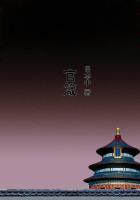"Oh, Douglas," cried the queen, "you alone could foresee and calculate everything thus. Thank you, thank you a hundred times!"
And she gave him her hand to kiss.
A vivid red flushed the young man's cheeks; but almost directly mastering his emotion, he kneeled down, and, restraining the expression of that love of which he had once spoken to the queen, while promising her never more to speak of it, he took the hand that Mary extended, and kissed it with such respect that no one could have seen in this action anything but the homage of devotion and fidelity.
Then, having bowed to the queen, he went out, that a longer stay with her should not give rise to any suspicions.
At the dinner-hour Douglas brought, as he had said, a parcel of cord.
It was not enough, but when evening came Mary Seyton was to unroll it and let fall the end from the window, and George would fasten the remainder to it: the thing was done as arranged, and without any mishap, an hour after the hunters had returned.
The following day George left the castle.
The queen and Mary Seyton lost no time in setting about the rope ladder, and it was finished on the third day. The same evening, the queen in her impatience, and rather to assure herself of her partisans' vigilance than in the hope that the time of her deliverance was so near, brought her lamp to the window: immediately, and as George Douglas had told her, the light in the little house at Kinross disappeared: the queen then laid her hand on her heart and counted up to twenty-two; then the light reappeared; they were ready for everything, but nothing was yet settled. For a week the queen thus questioned the light and her heart-beats without their number changing; at last, on the eighth day, she counted only as far as ten; at the eleventh the light reappeared.
The queen believed herself mistaken: she did not dare to hope what this announced. She withdrew the lamp; then, at the end of a quarter of an hour, showed it again: her unknown correspondent understood. with his usual intelligence that a fresh trial was required of him, and the light in the little house disappeared in its turn. Mary again questioned the pulsations of her heart, and, fast as it leaped, before the twelfth beat the propitious star was shining on the horizon: there was no longer any doubt; everything was settled.
Mary could not sleep all night: this persistency of her partisans inspired her with gratitude to the point of tears. The day came, and the queen several times questioned her companion to assure herself that it was not all a dream; at every sound it seemed to her that the scheme on which her liberty hung was discovered, and when, at breakfast and at dinner time, William Douglas entered as usual, she hardly dared look at him, for fear of reading on his face the announcement that all was lost.
In the evening the queen again questioned the light: it made the same answer; nothing had altered; the beacon was always one of hope.
For four days it thus continued to indicate that the moment of escape was at hand; on the evening of the fifth, before the queen had counted five beats, the light reappeared: the queen leaned upon Mary Seyton; she was nearly fainting, between dread and 'delight. Her escape was fixed for the next evening.
The queen tried once more, and obtained the same reply: there was no longer a doubt; everything was ready except the prisoner's courage, for it failed her for a moment, and if Mary Seyton had not drawn up a seat in time, she would have fallen prone; but, the first moment over, she collected herself as usual, and was stronger and more resolute than ever.
Till midnight the queen remained at the window, her eyes fixed on that star of good omen: at last Mary Seyton persuaded her to go to bed, offering, if she had no wish to sleep, to read her some verses by M. Ronsard, or some chapters from the Mer des Histoires; but Mary had no desire now for any profane reading, and had her Hours read, ****** the responses as she would have done if she had been present at a mass said by a Catholic priest: towards dawn, however, she grew drowsy, and as Mary Seyton, for her part, was dropping with fatigue, she fell asleep directly in the arm-chair at the head of the queen's bed.
Next day she awoke, feeling that someone was tapping her on the shoulder: it was the queen, who had already arisen.
"Come and see, darling," said she,--"come and see the fine day that God is giving us. Oh! how alive is Nature! How happy I shall be to be once more free among those plains and mountains! Decidedly, Heaven is on our side."
"Madam," replied Mary, "I would rather see the weather less fine: it would promise us a darker night; and consider, what we need is darkness, not light."
"Listen," said the queen; "it is by this we are going to see if God is indeed for us; if the weather remains as it is, yes, you are right, He abandons us; but if it clouds over, oh! then, darling, this will be a certain proof of His protection, will it not?"
Mary Seyton smiled, nodding that she adopted her mistress's superstition; then the queen, incapable of remaining idle in her great preoccupation of mind, collected the few jewels that she had preserved, enclosed them in a casket, got ready for the evening a black dress, in order to be still better hidden in the darkness: and, these preparations made, she sat down again at the window, ceaselessly carrying her eyes from the lake to the little house in Kinross, shut up and dumb as usual.
The dinner-hour arrived: the queen was so happy that she received William Douglas with more goodwill than was her wont, and it was with difficulty she remained seated during the time the meal lasted; but she restrained herself, and William Douglas withdrew, without seeming to have noticed her agitation.














